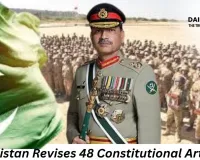BBC Apologises to Trump for Editing Error but Rejects ₹8,400-Crore Defamation Claim
Digital Desk

The BBC has apologised to US President Donald Trump for incorrectly editing a segment of his January 6, 2021 speech but has dismissed his $1 billion (₹8,400 crore) defamation demand, calling it unfounded. The clarification comes after a documentary produced by the broadcaster stitched together two separate lines from Trump’s speech, recorded nearly 50 minutes apart, creating the impression he continuously urged supporters toward aggressive action.
BBC Chair Samir Shah sent a formal letter of regret to the White House, acknowledging the mistake and confirming the clip would not be aired again. The organisation said the edit was an “unintentional” attempt to shorten content, not mislead viewers.
The controversy has triggered major upheaval within the broadcaster. Director-General Tim Davie and BBC News CEO Deborah Turness resigned amid escalating criticism, with Turness saying the matter had begun to damage the BBC’s credibility.
Despite the apology, the BBC rejected Trump’s defamation claim through a detailed written response. The broadcaster argued that the documentary was never aired in the United States, making reputational harm impossible to prove. It further noted that Trump, having been re-elected president, suffered no measurable damage and that political speech commentary is protected under US law. The BBC also emphasised that the disputed 12-second clip was part of an hour-long programme that included a range of viewpoints, including those supportive of Trump.
Legal experts say Trump is unlikely to succeed in any court action. Under UK law, defamation cases must be filed within 12 monthswell before this dispute arose. In the US, where the film did not air, establishing harm would be even more difficult.
The broadcaster is also reviewing a separate allegation reported by the Daily Telegraph that a 2022 Newsnight episode used a similar edit involving Trump’s remarks.
The documentary had merged Trump’s call for supporters to “peacefully and patriotically make our voices heard” with his later comment, “If you don’t fight like hell, you’re not going to have a country anymore,” altering the context and fuelling the backlash.











